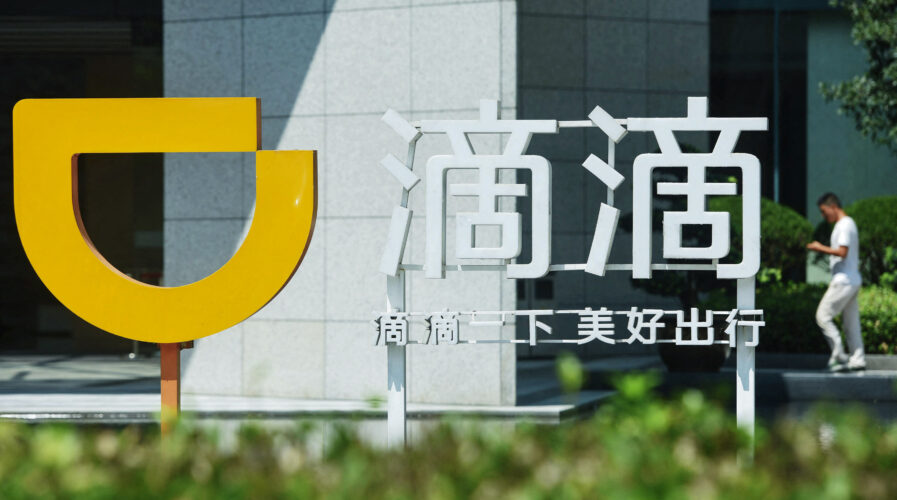
Didi is in risk of unprecedented penalties after US IPO. (Photo by STR / AFP) / China OUT
Didi at risk of unprecedented penalties after US IPO
- Apparently, regulators are weighing several penalties, from fines to delisting.
- The ride-hailing giant’s decision to go public despite pushback from the Cyberspace Administration of China is seen as a challenge to Beijing’s authority.
- This signals that Beijing is likely to impose harsher sanctions on Didi than on Alibaba Group Holding Ltd.
Weeks before Didi Global Inc. went public in the United States (US), China’s cybersecurity watchdog suggested the Chinese ride-hailing giant delay its initial public offering (IPO). Didi was also urged to conduct a thorough self-examination of its network security, according to reports quoting sources. Instead, Didi went ahead with its IPO, ignoring Beijing’s outright order.
The listing on the New York Stock Exchange raised about US$ 4.4 billion, making it the biggest stock sale for a Chinese company since Alibaba Group Holding Ltd’s IPO in 2014. Meanwhile, in Beijing, officials, especially those at the Cyberspace Administration of China, remained wary of the ride-hailing company’s troves of data potentially falling into foreign hands as a result of greater public disclosure associated with a US listing.
Now, according to a Bloomberg report citing people familiar with the matter, the same watchdogs are considering serious, perhaps unprecedented, penalties for Didi. “Regulators see the ride-hailing giant’s decision to go public despite pushback from the Cyberspace Administration of China (CAC) as a challenge to Beijing’s authority,” the report stated.
The cyberspace watchdog had said in a statement recently following Didi’s IPO that officials from the CAC, the Ministry of Public Security, the Ministry of State Security, the Ministry of Natural Resources, along with tax, transport, and antitrust regulators, had begun an investigation on-site at the company’s offices.
Bloomberg was also told that regulators are weighing a range of potential punishments, including a fine, suspension of certain operations, or the introduction of a state-owned investor, the people said. Also possible is a forced delisting or withdrawal of Didi’s U.S. shares, although it’s unclear how such an option would play out.
Outcomes are, if anything, far from certain. It is also likely for Beijing to impose harsher sanctions on Didi than it did on Alibaba Group, which was slapped with a record US$ 2.8 billion fine after a months-long antitrust investigation. The move made Alibaba finally agree to initiate measures to protect merchants and customers.
Although Didi’s IPO still went on to be a hit, the CAC pounced just days later, announcing a cybersecurity review because of the company’s data practices and then banning Didi’s app from the country’s app stores. Its shares quickly plunged below the offering price. The idea of an IPO has been supported by China’s regulators, sources claim that concerns about Didi’s data security practices have been an issue since at least April.
“Regulators urged Didi to ensure the security of its data before proceeding with the IPO or to shift the location to Hong Kong or mainland China where disclosure risks would be lower. Regulators didn’t explicitly forbid the company from going public in the US, but they felt certain Didi understood the official instructions,” Bloomberg said.
Some even reckon that Didi may have rushed its IPO out before China unveiled a new web security law, which could have hurt its valuation. In fact, just days after the offering, China proposed new rules that would require nearly all companies seeking to list in foreign countries to undergo a CAC cybersecurity review.
Investors are already rattled. China’s unprecedented tech crackdown has wiped US$1 trillion off the value of overseas-listed Chinese tech stocks since February — one of the worst sell-offs in history, Goldman Sachs analysts said in a research report last week.
READ MORE
- Ethical AI: The renewed importance of safeguarding data and customer privacy in Generative AI applications
- How Japan balances AI-driven opportunities with cybersecurity needs
- Deploying SASE: Benchmarking your approach
- Insurance everywhere all at once: the digital transformation of the APAC insurance industry
- Google parent Alphabet eyes HubSpot: A potential acquisition shaping the future of CRM


